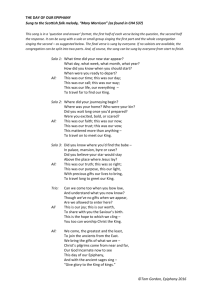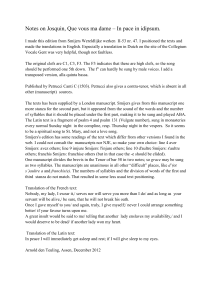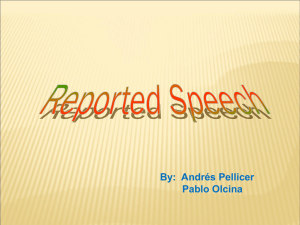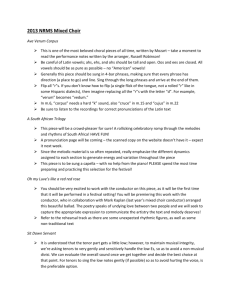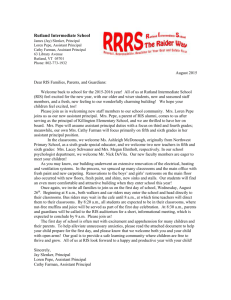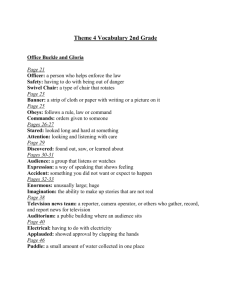Word document
advertisement
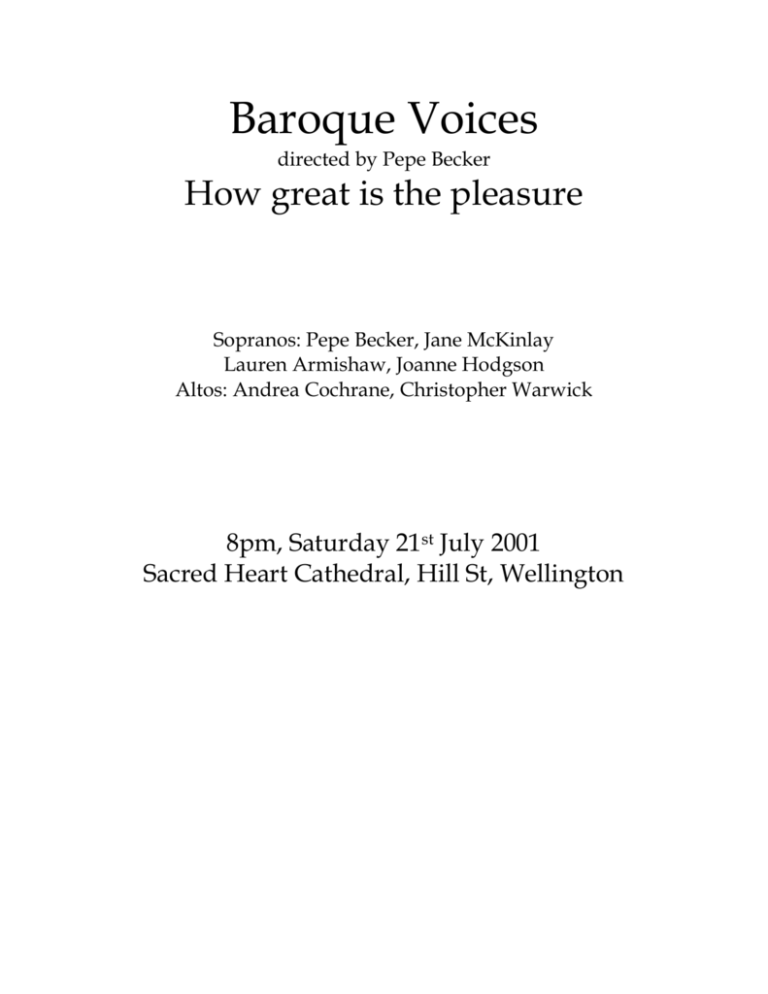
Baroque Voices directed by Pepe Becker How great is the pleasure Sopranos: Pepe Becker, Jane McKinlay Lauren Armishaw, Joanne Hodgson Altos: Andrea Cochrane, Christopher Warwick 8pm, Saturday 21st July 2001 Sacred Heart Cathedral, Hill St, Wellington Baroque Voices’ sopranos and altos (Pepe, Jane, Jo, Lauren, Andrea and Chris) have pleasure in welcoming you to this concert, ‘How great is the pleasure’: a potpourri of deliciously relishable music for unaccompanied high voices. These songs of life, death, love and devotion (both sacred and secular) include music by anonymous Medieval composers (from England, France, Spain and Italy); Renaissance madrigalists Morley, Wilbye and Monteverdi; 19th and 20th Century composers Czerny, Poulenc and Duruflé; contemporary NZ composers Jack Body and Pepe Becker; as well as some arrangements (by Pepe Becker) of traditional Irish folk songs….. there’s something for everyone! Sit back and allow these selected gems (from 900 years of vocal music) to transport you, briefly, from the stresses of modern living… ♥♥♥♥♥♥♥♥♥♥♥♥♥♥♥♥♥♥♥♥♥♥♥♥♥♥♥♥♥♥♥♥♥♥♥♥♥♥♥♥♥♥♥♥♥♥♥♥♥♥♥♥♥♥♥♥♥♥♥♥♥♥♥♥♥♥♥♥♥♥♥♥ Introduction How great is the pleasure – H. Harrington (c.1786) A round in three parts, sung by: ALL Text: How great is the pleasure, how sweet the delight; when soft love and music together unite. Christmas/Annunciation Angelus ad Virginem (Gabriel fram Heven-King) – anon., English (13th Century) A monophonic carol, sung by: Pepe, Jane, Lauren, Jo, Andrea (solo verse) Text: Gabriel, fram Heven-King sent to the Maide sweete, Broute hir blisful tiding and fair he gan hir greete: ‘Heil be thu, ful of grace aright! For Goddes Son, this Heven-Light, For mannes love wil man bicome and take fles of thee, Maide bright, Manken free for to make of sen and devles might.’ Mildelich him gan and swere the milde Maide thanne: ‘Wichewise sold ich bere a child withute manne?’ Th’angel hir seid: ‘Ne dred tee nout; thurw th’oligast sal been iwrout This ilche thing warof tiding ich bringe; al manken wurth ibout Thurw thine sweet childinge and ut of pine ibrout.’ Wan the Maiden understood and th’angels wordes herde, Mildelich, with milde mood, to th’angel hie and swerde: ‘Ure Lords thewe maid iwis ich am, that heer aboven is; Anentis me fulfurthed be thi sawe that ich, sith his wil is, A maid withute lawe, of moder have the blis.’ Angelus ad Virginem (Gabriel fram Heven-King) – anon., English (13th Century) Another version of the same carol, sung by: ALL (Pepe – solo verse) Text: see above _____________________________________________________________________________ 2 Life in general: chaos and order Dappoi che’l sole – Niccolo da Perugia (later 14th Century) An Italian ‘caccia’ (round), with two canonic voices and a more slowly moving ‘tenor’ line; sung by: ALL Translation: The sun was hiding its sweet rays and the moon poured forth its splendour, when I heard a great noise and cries of ‘Fire, fire!’ Then, after a moment, ‘Where is it, where is it?’ ‘It’s here!’ ‘Come, come, every man, come!’ ‘Bring light!’ ‘Out with the lamps and the lanterns!’ ‘You with the bell, ring out!’ ‘Ding, dong, ding, dong.’ ‘Sound the alarm!’ ‘Here, you, take this helmet, this axe and this gorget (neck armour-piece)!’ ‘Hurry, hurry, for the fire is spreading!’ ‘Send for the servants!’ ‘Water, water, up with the jugs!’ Some brought ewers, some ladders, and some were hurt. And some shouted: ‘Hurry, help me!’ ‘You with the trumpet, blow!’ ‘Ta-ta, ta-ta!’ ‘Step back!’ Some scampered away and some looted; while others poured water; and one smashed at the door with a hatchet. Here everyone was hurrying, intent on smothering the fire and the sparks. The sound of alarm bells had died away when the ringers shouted: ‘To your homes, everybody, for the fire is out!’ Turning, I saw the one who is always in my heart – C, I, C, I, with L, with I and A. (Cecilia) Praemii dilatio – anon., French (c.1210) A ‘conductus’ (a type of rhymed, metrical Latin poem with serious, political or moral subject matter); sung by: Jane, Pepe, Andrea Translation: The postponement of a reward is a punishment for loyalty which, according to the proverb, results from the faults of great men who delay recompense for the service of faithful men, lest, the reward having been received, they should be less zealous in doing their duty. But the more a reward is postponed the more dearly it is sold. Bartered for long service, a gift loses its virtue. Biblical lovers (texts from the ‘Song of Songs/Song of Solomon’) Quam pulchra es – John Dunstable (c.1385-1453) A freely-composed Latin ‘antiphon’, mostly homophonic, with a melismatic “Alleluia” at the end; sung by: Pepe, Andrea, Chris Translation (from the ‘Song of Solomon’, ch.7, verses 6,7,5,4,11,12): How beautiful and graceful you are, how delightful is your love. You are as graceful as a palm tree and your breasts are clusters of dates. Your head is like mount Carmel; your neck is like a tower of ivory. Come, my darling, let us go to the countryside, and see wether the blossoms are opening and the pomegranate trees are blooming. There I will give you my love. Alleluia. Ego flos campi – Clemens non Papa (c.1500-1556) A Latin motet; sung by: ALL Translation (from the ‘Song of Songs’, ch.2, verses 1-3): The woman… I am the flower of the field and the lily of the valley. The man… As a lily among thorn bushes, so is my dear one among maidens. The woman… As an apple tree among other trees in a wood, so is my beloved among young men. 3 Sacred rejoicing/praising Confitemini Domino – Alessandro Costantini (c.1581-c.1657) A Latin motet; sung by: ALL Translation (from Psalm 107, verse 1): Give thanks to the Lord, for He is good: for his mercy endureth forever. Alleluia. Deus canticum novum – Giovanni Matteo Asola (c.1540-1609) A Latin motet; sung by: ALL Translation (based on Psalm 144, verse 9): O God, I will sing you a new song, alleluia: on the ten-stringed lyre I will play for you, alleluia. You are my God, and I shall acknowledge You and exult You, alleluia. Merry and woeful Renaissance lovers Hor care canzonette – Claudio Monteverdi (1567-1643) An Italian ‘canzonetta’ for three voices; sung by: Pepe, Lauren, Andrea Translation: Now dear canzonets, surely you will go happily singing; always thanking those who wish to sing you, kissing their hands without speaking. My sweet canzonets, you will go on alone though, always thanking those who sing you; and if you desire forgiveness for your errors, you need only ask for it. Il mio martir - Claudio Monteverdi (1567-1643) An Italian ‘canzonetta’ for three voices; sung by: Jane, Jo, Chris Translation: My suffering I keep hidden in my heart. If it were revealed, alas, little would it help me. No one believes my pain until he himself feels it. Therefore if no one believes my suffering, I am wounded, alas; and though it goes unseen, this mortal ache proves it. _____________________________________________________________________________ Three Irish folk songs: on love, death and discomfort! The Blacksmith – Trad., arr. Pepe Becker (1994) Sung by: ALL Text: A blacksmith courted me nine months and better, He fairly won my heart, wrote me a letter. With his hammer in his hand he looked so clever, And if I was with my love I’d live for ever. And where is my love gone, with his cheeks like roses And his good black billycock on, decked with primroses? I’m afraid the scorching sun will shine and burn his beauty, And if I was with my love, I’d do my duty. 4 What did you promise, love, when you sat beside me? You said you would marry me and not deny me. ‘If I said I’d marry you, it was only for to try you, So bring your witness, love, and I’ll ne’er deny you.’ Oh witness have I none, save God almighty, And He’ll reward you well for the slighting of me. (Her lips grew pale and white, it made her poor heart tremble: To think she loved one, and he proved deceitful). Female Rambling Sailor - Trad., arr. Pepe Becker (1994) Sung by: ALL (Pepe solo) Text: Come all you fair and tender maids, and listen to my ditty – All in Grey’s End there lived a maid, and she was young and pretty. Her true love he was prenced away to perish on the stormy sea, Which caused this fair maid for to say: ‘I’ll be a female sailor’. In a jacket blue and trousers white, she looked a sailor neat and tight, And the sea it was the heart’s delight of the female rambling sailor. When a storm came on the raging sea, she was ready at her station. But when all was calm as calm could be, she left her occupation. Come evening time, this damsel young, she charmed the sailors with her tongue, For she’d roamed the decks and sweetly sang, did the female rambling sailor; From stem to stern she’d went her way, where ‘times she had been merry, When her foot it slipped and down she fell, she bid this world a last farewell. Her snowy white breast when sighted came, it appeared to be her female frame, And Rebecca Young it was the name of the female rambling sailor. On river and sea she was known well, no sailor there could her excel; Let a tear downfall in a last farewell to the female rambling sailor. Galbally Farmer - Trad., arr. Pepe Becker (1994) Sung by: ALL (Pepe solo, Jo & Pepe ‘diddly breaks’ between verses) Text: One evening of late as I happened to stray To the county Tipperary, I straight made my way To dig the potatoes and work by the day; I hired with a Galbally farmer. I asked him how far we were bound for to go, For the night it was dark and the north wind did blow, My stomach was empty, my spirits were low, For I’d got neither whiskey nor porter. I well recollect it was Michaelmas night, And to a fine supper he did me invite – A cup of sour milk that would physic a snipe: It would give you the trotting disorders! The wet old potatoes would poison the cats, And the barn where my bed was was swarming with rats; ‘Twas little, I thought it would ere be my lot To lie in that hole until mornin’. 5 From what he had said to me, I understood My bed in the barn it was not very good: The mattress was made in the time of the flood, And the blankets and sheets in proportion. Upon this old miser I looked with a frown, And the straw was brought out for to make my shake down. I wished I had never seen Galbally town, Nor the skies above Darby O’Leary! ♥ INTERVAL ♥ please feel free to buy Baroque Voices CDs and/or sign the Mailing List Life in general: the flurry of wedding planners; and the torment of a besotted would-be lover Arise, get up, my dear – Thomas Morley (1557-1602) An English madrigal; sung by: ALL Text: Arise, get up, my dear, make haste to begone thee! Lo, where the bride, fair Daphne bright, tarries on thee. Hark, O hark, yon merry maidens squealing: spicecake, sops in wine are adealing. Run then, run apace then and get a bridelace, and a gilt rosemary branch the while yet there is catching, and then hold fast for fear of old snatching. Alas, my dear, (why weep she?) O fear not that, dear love, the next day keep we. List, hark yon minstrels, how fine they firk it; and how the maids jerk it, with Kate and Will, Tom and Gill, now a skip, then a trip, finely set a loft, there again as oft: Hey ho, blessed holiday! / fine brave holiday! / All for fair Daphne’s wedding day! O, what shall I do? – John Wilbye (1574-1638) An English madrigal; sung by: ALL Text: O, what shall I do, or whither shall I turn me? Shall I make unto her eyes? O no, they’ll burn me. Shall I seal up my eyes and speak my part? Then in a flood of tears I drown my heart, for tears, being stopped, will swell for scope, though they o’erflow; love, life and hope, by beauty’s eye I’ll choose to die. At thy feet I fall, fair creature rich in beauty; and for pity call, O kill not love and duty; let thy smooth tongue fan on my sense thy breath, to stay thine eyes from burning me to death. But if mercy be exiled from a thing so fair compiled, then patiently by thee I’ll die. Devotion to the Virgin Mary O Virgo splendens – anon., Spanish (14th Century) A Spanish-Latin ‘caça’ (equivalent of the Italian ‘caccia’, the French ‘chace’ and the English ‘catch’ – or round); sung by: Pepe, Jane, Andrea Translation: O resplendent Virgin, here on the miraculous mountain (cleft everywhere by dazzling wonders, and which all of the faithful climb), behold with the merciful eye of love those enmeshed in the bonds of sin, that they will not have to endure the blows of hell, but rather will be named among the blessed through your intercession. 6 Tota pulchra es – Maurice Duruflé (1902-1986) A Latin motet; sung by: ALL Translation: No one is more pure and immaculate than you, O Mary. Your garments are without sin and made for you alone. You glorify Jerusalem, you praise Israel, you bring honour to our people. You are the most pure virgin, Mary. Easter texts Ave verum – Francis Poulenc (1899-1963) A Latin motet; sung by: ALL Translation: Behold the true body of Christ, born of the Virgin Mary, who sacrificed Himself on the cross for Man’s sake. Exite Sion filiae – Carl Czerny (1791-1857) A Latin motet; sung by: Lauren, Jo, Andrea, Chris Translation: Go forth, chaste virgins, daughters of the King of Zion; behold the crown of Christ, which His very mother hath woven. His bloodied head is dishevelled and rent by thorns; and His pale face regards approaching death. What field, uncrossed by furrows, bristling with briars and brambles, brought forth this grievous harvest? What barbarous hand did harvest it? The thorn, reddening with the blood of Christ, changes its spines into roses and, surpasses the palm-frond as a fitting sign of triumph. Virtue, honour, praise and glory be to God the Father, with His Son and with the Holy Paraclete, forever and ever. Amen. More lovers’ concerns Taurus I: Night and Morning – Pepe Becker (b.1966), May 2001 This work for unaccompanied high voices (SSSSAA) is set to words by 19th Century Taurean poet Robert Browning (1812-89); and is dedicated to my Taurean sister, Kate Ward-Smythe, and my other Taurean family and friends, especially Gran (now 85 – on the cusp of Taurus & Gemini), Simon Christie (an ex-member of Baroque Voices, currently residing in Holland), Jessie (my singing teacher from London days), Rosie (my first singing teacher – on the cusp of Aries & Taurus), Sue B, Carla P, Penelope S, Josh D, Katrin C, Edmund and Maria. -Pepe Sung by: ALL Text: Meeting at Night The gray sea and the long black land; And the yellow half-moon large and low; And the startled little waves that leap In fiery ringlets from their sleep, As I gain the cove with pushing prow, And quench its speed i’ the slushy sand. Then a mile of warm sea-scented beach; Three fields to cross till a farm appears; A tap at the pane, the quick sharp scratch And blue spurt of a lighted match, And a voice less loud, through its joys and fears, Then the two hearts beating each to each! 7 Parting at Morning Round the cape of a sudden came the sea, And the sun looked over the mountain’s rim: And straight was a path of gold for him, And the need of a world of men for me. NOTE: In Dramatic Romances (1845) these two poems were printed together as one work entitled “Night and Morning”. The two parts were separated and re-titled in 1849. Songs V & VII from ‘Love sonnets of Michelangelo’ – Jack Body (b.1944), 1982 The seven ‘Love Sonnets…’ , set to poems by Michelangelo (Michelagniolo Buonarroti, 14751564) were composed in 1982 to accompany a dance choreographed and performed by Michael Parmenter. The singers for the first performance were Lesley Graham and Linden Loader. Sung by: Pepe, Andrea Outline of Italian translations: V: Gripped by passion, the poet sees no escape from love. ‘By trying to diminish grief I but double it.’ VII: ‘Sleep is sweet, but better to be made of stone, …wake me not.’ Two lullabies Lullaby III from ‘Five Lullabies’ - Jack Body (b.1944), 1989 ‘Five Lullabies’, composed in 1989, were intended as a retirement tribute for Peter Godfrey to whom they are dedicated. The words are ‘invented languages’ and have no semantic meaning. Sung by: Pepe, Jane, Andrea, Chris Malolo – Annea Lockwood (b.1939) A lullaby on a Samoan text; sung by: ALL (Andrea solo last line) Samoan words used: lelei: good, pele: beloved, suamalie: sweet, manulele: bird, malolo: rest Mellow melancholy When will we know? – Pepe Becker (b.1966), July 1986, arr. June 2001 for ensemble This ‘Jazz’ song (originally for solo voice and jazz guitar) was written in my second year at Wellington’s Victoria University, when I was ‘finding my roots’ here in the North Island (having been brought up in the South Island, by Wellington-born parents). - Pepe Sung by: ALL (Jo on ‘lead tune’) Text: There’s a southern tree in a northern land, it’s been growing there so long – There’s a southern breeze moving through those trees, and it makes me think of you: How long will it last, when will we know? Is it all in a dream that’s moving too slow? How can we walk if we don’t even know the way, or what we’re trying to say? I guess time will blow it all away. 8

